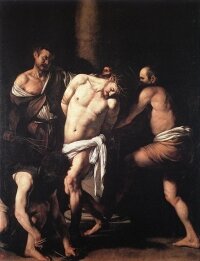 |
| Flagellation of Christ, Artist: CARAVAGGIO, Date: c. 1607 |
The Gospels were all composed during the latter part of the first century, and there is distinct historical evidence to show that they were used and accepted as authentic before the end of the second century.
The principal sources of information regarding Jesus' life and teachings are the four canonical gospels though some scholars argue that other texts (such as the Gospel of Thomas) are as relevant as the canonical gospels to the historical Jesus. Most critical scholars in the fields of history and biblical studies believe that ancient texts on Jesus' life are at least partially accurate, agreeing that Jesus was a Galilean Jew who was regarded as a teacher and healer. They also generally accept that he was baptized by John the Baptist, and was crucified in Jerusalem on orders of the Roman Prefect of Judaea Pontius Pilate, on the charge of sedition against the Roman Empire.

Jesus De Nazareth
Edmar Castaneda Live At Jazz Standard
Christian views of Jesus (see also Christology) center on the belief that Jesus is divine, is the Messiah whose coming was prophesied in the Old Testament (e.g. Deut. 18:15;Judges 13:5;Amos 2:11;Lam. 4:7;Isaiah:53;Isaiah 7:14, etc.), and that he was resurrected after his crucifixion. Christians predominantly believe that Jesus is the "Son of God" (generally meaning that he is the son of God, the second person in the Trinity), who came to provide salvation and reconciliation with God by his death for their sins.
Other Christian beliefs include Jesus' virgin birth, performance of miracles, ascension into Heaven, and future Second Coming. While the doctrine of the Trinity is widely accepted by Christians, a small minority instead hold various nontrinitarian beliefs concerning the divinity of Jesus.
More...


No comments:
Post a Comment